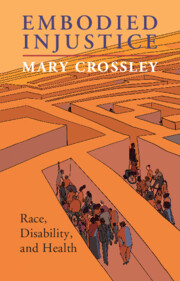-
Select format
-
- Publisher:
- Cambridge University Press
- Publication date:
- 18 August 2022
- 25 August 2022
- ISBN:
- 9781108900928
- 9781108830294
- 9781108820608
- Dimensions:
- (229 x 152 mm)
- Weight & Pages:
- 0.52kg, 260 Pages
- Dimensions:
- (229 x 152 mm)
- Weight & Pages:
- 0.39kg, 260 Pages
You may already have access via personal or institutional login
Book description
Black people and people with disabilities in the United States are distinctively disadvantaged in their encounters with the health care system. These groups also share harsh histories of medical experimentation, eugenic sterilizations, and health care discrimination. Yet the similarities in inequities experienced by Black people and disabled people and the harms endured by people who are both Black and disabled have been largely unexplored. To fill this gap, Embodied Injustice uses an interdisciplinary approach, weaving health research with social science, critical approaches, and personal stories to portray the devastating effects of health injustice in America. Author Mary Crossley takes stock of the sometimes-vexed relationship between racial justice and disability rights advocates and interrogates how higher disability prevalence among Black Americans reflects unjust social structures. By suggesting reforms to advance health equity for disabled people, Black people, and disabled Black people, this book lays a crucial foundation for intersectional, cross-movement advocacy to advance health justice in America.
Reviews
‘Embodied Justice is an incredibly powerful and important book. It is important reading for anyone trying to understand the history and current state of health justice in America. If we truly believe that everyone deserves a fair opportunity for health and well-being, we must understand the inequities faced by Black people and people with disabilities in America, and how these inequities are compounded for Black people with disabilities.’
Richard E. Besser - M.D., President of the Robert Wood Johnson Foundation and former acting director for the Centers for Disease Control and Prevention
‘Professor Mary Crossley has made a stunning contribution, advancing the literature on and understanding of health disparities in America. Her nuanced understanding of the intersectionality of racism and ableism does more than connect a broad array of empirical knowledge or two social movements, although it certainly does do that. This book shines a searing light on the horrific injustices that eugenics-inspired law and policy continue to perpetuate today. This is a must-read for educators, health care providers, legislators, and everyone seeking to advance health equity in this country.’
Dayna Bowen Matthew - J.D., Ph.D., Dean and Harold H. Greene Professor of Law, George Washington University Law School, author of Just Health: Treating Structural Racism to Heal America
‘Trust and the presumption of professional beneficence are the heart of healing relationships between patients and clinicians. However, as Crossley’s exhaustive and persuasive arguments make chillingly clear, centuries of societal marginalization and discriminatory policies have given Black people and disabled people little reason to expect equitable healthcare in the U.S.’
Lisa Iezzoni - M.D., MSc, Professor of Medicine, Harvard Medical School and Director, Mongan Institute Health Policy Center, Massachusetts General Hospital, author of Making Their Days Happen: Paid Personal Assistance Services Supporting People with Disability Living in Their Homes and Communities
‘Crossley deftly applies an intersectional and cross-disciplinary lens, revealing new avenues for research and action at a critical moment in the movement to realize health justice’
Lindsay Wiley - J.D., M.P.H., Professor of Law, UCLA School of Law, co-author of Public Health Law: Power, Duty, Restraint
'Recommended.'
L. T. Grover Source: Choice
Contents
Metrics
Altmetric attention score
Full text views
Full text views help Loading metrics...
Loading metrics...
* Views captured on Cambridge Core between #date#. This data will be updated every 24 hours.
Usage data cannot currently be displayed.
Accessibility standard: Unknown
Why this information is here
This section outlines the accessibility features of this content - including support for screen readers, full keyboard navigation and high-contrast display options. This may not be relevant for you.
Accessibility Information
Accessibility compliance for the PDF of this book is currently unknown and may be updated in the future.



